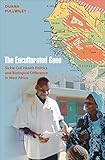The Enculturated Gene : Sickle Cell Health Politics and Biological Difference in West Africa / Duana Fullwiley.
Material type: TextPublisher: Princeton, NJ : Princeton University Press, [2011]Copyright date: ©2012Edition: Course BookDescription: 1 online resource (368 p.) : 7 halftones. 1 line illus. 4 mapsContent type:
TextPublisher: Princeton, NJ : Princeton University Press, [2011]Copyright date: ©2012Edition: Course BookDescription: 1 online resource (368 p.) : 7 halftones. 1 line illus. 4 mapsContent type: - 9780691123172
- 9781400840410
- Genetic disorders -- Social aspects -- Senegal
- Genetic disorders -- Social aspects -- Senegal
- HEALTH & -- FITNESS -- Diseases -- General
- HEALTH & -- FITNESS -- Health Care Issues
- HISTORY -- Africa -- West
- Kinship -- Health aspects -- Senegal
- Kinship -- Health aspects -- Senegal
- MEDICAL -- Diseases
- MEDICAL -- Health Care Delivery
- MEDICAL -- Health Policy
- MEDICAL -- Public Health
- SOCIAL SCIENCE -- Disease & -- Health Issues
- Sickle cell anemia -- Genetic aspects
- Sickle cell anemia -- Patients -- Services for -- Senegal
- Sickle cell anemia -- Social aspects -- Senegal
- Sickle cell anemia -- Genetic aspects
- Sickle cell anemia -- Patients -- Services for -- Senegal
- Sickle cell anemia -- Social aspects -- Senegal
- SOCIAL SCIENCE / Anthropology / Cultural & Social
- Africa
- African anthropology
- African genetics
- African sicklers
- Albert Royer Children's Hospital
- CNTS
- Centre nationale de transfusion sanguine
- DNA haplotypes
- DNA sequences
- HbAS
- International Organization for the Fight against Sickle Cell
- National Blood Transfusion Center
- OILD
- RFLP
- Restriction Fragment Length Polymorphism
- Senegal
- Senegalese attitudes
- Senegalese sickle cell
- alternative care
- biological expressions
- biosocial politics
- culture
- disease experiences
- disease expression
- economic austerity
- economically triaged care
- ethnic population purity
- fagara
- genetic difference
- genetic sequence
- geneticists
- global health problems
- global health
- healing practices
- health intervention
- health
- healthy sicklers
- heterozygous sickle cell
- low-tech strategy
- multilateral institutions
- normalization techniques
- patient advocacy
- political apathy
- population
- public health
- public neglect
- self-care
- sickle cell DNA markers
- sickle cell anemia
- sickle cell gene
- sickle cell research
- sickle cell trait
- sicklers
- social networks
- traditional plants
- vitality
- 362.1961527009663 23
- RA645.S53 F85 2017
- online - DeGruyter
- Issued also in print.
| Item type | Current library | Call number | URL | Status | Notes | Barcode | |
|---|---|---|---|---|---|---|---|
 eBook
eBook
|
Biblioteca "Angelicum" Pont. Univ. S.Tommaso d'Aquino Nuvola online | online - DeGruyter (Browse shelf(Opens below)) | Online access | Not for loan (Accesso limitato) | Accesso per gli utenti autorizzati / Access for authorized users | (dgr)9781400840410 |
Frontmatter -- Contents -- Illustrations -- Preface -- Acknowledgments -- Chapter one. Introduction: The Powers of Association -- Chapter two. Healthy Sicklers with "Mild" Disease: Local Illness Affects and Population- Level Effects -- Chapter three. The Biosocial Politics of Plants and People -- Chapter four. Attitudes of Care -- Chapter five. Localized Biologies: Mapping Race and Sickle Cell Difference in French West Africa -- Chapter six. Ordering Illness: Heterozygous "Trait" Suffering in the Land of the Mild Disease -- Chapter seven. The Work of Patient Advocacy -- Conclusion. Economic and Health Futures amid Hope and Despair -- Notes -- References -- Index
restricted access online access with authorization star
http://purl.org/coar/access_right/c_16ec
In the 1980s, a research team led by Parisian scientists identified several unique DNA sequences, or haplotypes, linked to sickle cell anemia in African populations. After casual observations of how patients managed this painful blood disorder, the researchers in question postulated that the Senegalese type was less severe. The Enculturated Gene traces how this genetic discourse has blotted from view the roles that Senegalese patients and doctors have played in making sickle cell "mild" in a social setting where public health priorities and economic austerity programs have forced people to improvise informal strategies of care. Duana Fullwiley shows how geneticists, who were fixated on population differences, never investigated the various modalities of self-care that people developed in this context of biomedical scarcity, and how local doctors, confronted with dire cuts in Senegal's health sector, wittingly accepted the genetic prognosis of better-than-expected health outcomes. Unlike most genetic determinisms that highlight the absoluteness of disease, DNA haplotypes for sickle cell in Senegal did the opposite. As Fullwiley demonstrates, they allowed the condition to remain officially invisible, never to materialize as a health priority. At the same time, scientists' attribution of a less severe form of Senegalese sickle cell to isolated DNA sequences closed off other explanations of this population's measured biological success. The Enculturated Gene reveals how the notion of an advantageous form of sickle cell in this part of West Africa has defined--and obscured--the nature of this illness in Senegal today.Some images inside the book are unavailable due to digital copyright restrictions.
Issued also in print.
Mode of access: Internet via World Wide Web.
In English.
Description based on online resource; title from PDF title page (publisher's Web site, viewed 24. Aug 2021)


